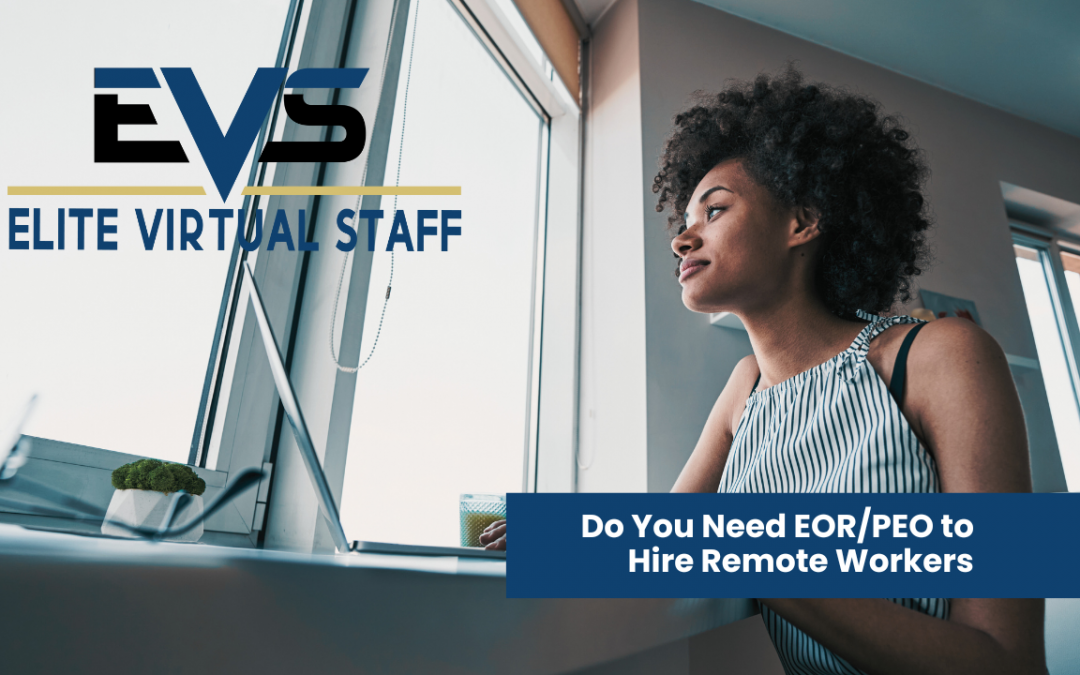Remote work has gained much traction during and post-Covid pandemic as companies realized they have the ability to expand and grow their businesses through outsourcing. One of the valued benefits of outsourcing offshore is having access to a vast pool of talents scattered across the globe. However, there are certain rules and regulations to follow to enable companies to outsource internationally.
A global Employer of Record (EOR), can help guide you to reach your global expansion goals.
What is a Global Employer of Record?
A global employer of record is a third-party company that takes over all the employment tasks on behalf of another company. This allows international companies to legally employ professionals from anywhere in the world without having to set up a local entity to engage in the employment legalities of the vendor country. Overseas companies can build offshore teams through an EOR which keeps them compliant with local laws and minimizes risks and liabilities.
To illustrate, if a company in the United States wants to acquire remote talent in the Philippines, it can do so through an EOR. The EOR in essence becomes the legal employer of that worker. It then “leases” the employee to the US company/ The EOR will basically have full control over the remote employee’s day-to-day management.
EORs not only take on legal responsibilities for the recruitment and hiring of the company’s chosen talent, but they also take care of the ff:
- Onboarding
- Payroll processing
- Providing statutory benefits
- Other Human Resource Management
How do EORs function?
Once an EOR has been established in the country of employment jurisdiction, the EOR draws up a service agreement contract with the foreign company that details the relationship of the client between the EOR and the employee. At the same time, an employment contract is made by the EOR which will be co-signed with the hired employee.
A service agreement contract typically states the tasks, responsibilities, and reporting structure.
What does your company need? An EOR or PEO?
PEOs and EORs operate in different capacities. Before outsourcing offshore, it is important to determine which service is best for your business.
If you have established a local entity or are setting up/incorporating a company or registering your business in new global markets, you will need local HR support. Having PEOs can easily take on the trickier responsibilities of HR such as payroll and taxation.
On the other hand, if you’re hiring global remote work workers and are not setting up any local entities in the country of employment jurisdiction of your hired talent, an EOR is more suited to fill in your needs because EORs already have local entities in the hiring country.
Service agreements are drawn up by EORs/ PEOs and signed by clients to outline the exact services that have been acquired.
How much does an EOR or PEO cost?
The pricing models for EORs and PEOs can be categorized between flat fee structures and percentage structures. However, it is advisable to pass up a partnership agreement that charges a percentage instead of a flat rate.
A percentage rate-based model will disincentivize client companies from offering fair and competitive compensation to hired talents. This means you pay more to a third party when you want to give your remote employee a well-deserved promotion or raise.
A flat rate model allows you to hire global talent and them the salary they deserve. The rate covers everything and with no surprise transaction fees or percentages.
How to choose the right EOR/ PEO for your business?
There are hundreds of EORs and PEOs that operate in every country across the globe. Knowing what key qualities to look for can ensure you of a good working relationship down the road.
- Combines intelligent and accurate automation with human expertise and passion.
- Able to provide wide coverage and jurisdiction
- Dynamic, proactive, and transparent
- Fosters a positive liaison with employees
- Offers flexibility on top of value for money
Key Takeaways
So, do you really need an EOR or a PEO? Operating a business without an EOR or a PEO can mean complications down the line. This can eventually turn out to be more time-consuming and expensive by having to deal with the legal processes that differ from one country to another. EORs and PEOs allow you cost-efficient access to skilled professionals across the globe so you can concentrate on other key operating functions and decisions.
Imagine finding the perfect virtual assistant or an invaluable software developer who lives halfway across the world from you. However, your ideal talent prefers to work with the security and benefits of a full-time employee. How far are you willing to go to make things work?
At Elite Virtual Staff, we can do it all for you. We have offices based in the Philippines that can take on all the legal requirements and documentation needed to hire any Filipino virtual talent of your choice. Let us do the hard work. Book a free consultation with us today and find out how we can move things forward for your business.

